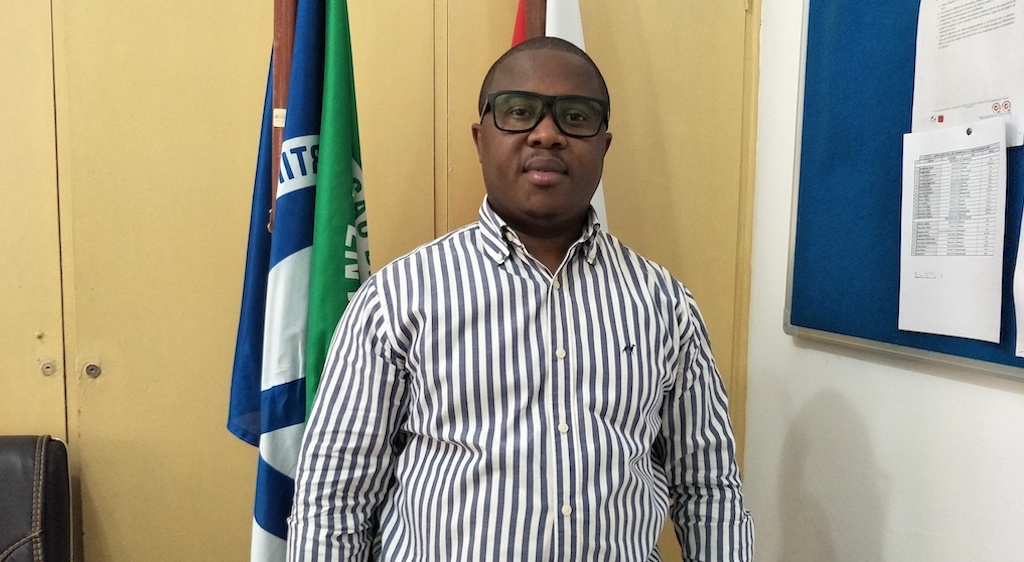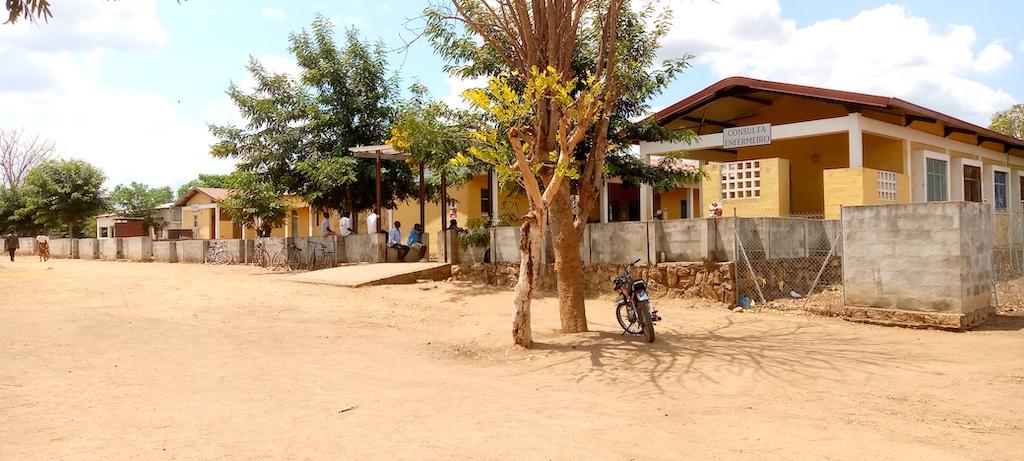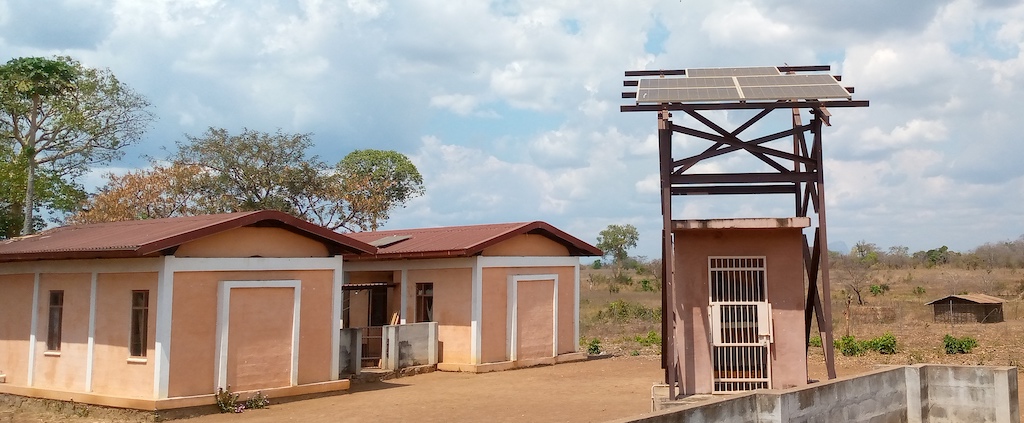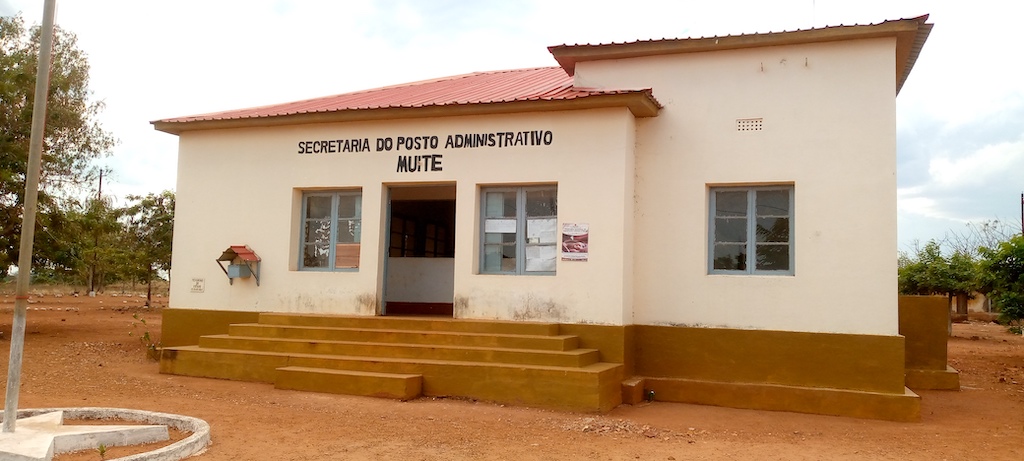
17 Oct Solar powers up lives in northern Mozambique
Government authorities and communities have switched to solar panels and photovoltaic plants to power health units, schools and water supply systems, reports Nelsa Momade Pedro

The use of renewable energy by the administrative posts contributes to the reduction of fossil resources in a region that has potential for timber production and where forestry exploitation is rampant. Photo: Nelsa Momade Pedro
Fernando Sozinho, a farmer and father of five children living in the far north of Mozambique, uses solar panels to sustain production of pigeon peas, cassava, corn and sesame on his 4ha farm. Before he got the panels, he and his family had to rely candles and bottles filled with diesel or petrol, causing smoke and other health hazards.
“Solar panels have many advantages. We are able to charge our cellphones and light up the house. At night we turn on our speakers and then we dance,” he said.
Like Sozinho, government authorities in the northern reaches of Nampula province have switched to solar panels and photovoltaic plants to power health units, schools and water supply systems.
In the districts of Mecubúri and Larde, with 155,624 and 72,976 inhabitants respectively, two important administrative posts rely on solar panels to improve the life quality of their residents.
The use of renewable energy by the administrative posts, Muite in Mecubúri and Mucuali in Larde, contributes to the reduction of fossil resources in a region that has potential for timber production and where forestry exploitation is rampant.
Forestry products
Electrification in rural Nampula, the most populous province in the Southern African country, continues to be a challenge (see Nampula far from renewable energy goals). The majority of the population still relies on the use of forest products to meet their energy needs.
The rise of solar power as an alternative is taking place in a country which, according to the 2012 Mozambique Atlas, “has vast energy resources from renewables and has a hot tropical climate. Its average annual temperature is 23 to 26ºC in coastal areas”.
Izildo Nogueira, representative of the National Energy Fund (FUNAE) in Nampula, said it is building two solar power plants in the district of Mecubúri. The units take an average of six months’ construction and are scheduled to be completed by the end November 2023.
“Also, at the administrative post of Milhana we plan to electrify more than 1,500 homes and in Muite around 500 families. The plants will be able to supply energy to close to 1,000 connections in this project, called Enabel, which is financed by Belgian cooperation,” Nogueira said.
“In addition, the administrative post of Lúrio in the district of Memba has capacity for almost 160 connections. A plant was also built that benefits almost 45 connections in the administrative post of Namiroa, in the district of Erate.”
Without mentioning the financiers, Nogueira said electrification projects implemented by FUNAE since 2018 in the various administrative posts are valued at a total of 60-million meticais (about US$940,000).

Izildo Nogueira: Eectrification projects implemented by FUNAE since 2018 in the various administrative posts are valued at a total of 60-million meticais (about US$940,000). Photo: Nelsa Momade Pedro
Health units
According to Nogueira, 100 health units in Nampula have been electrified by FUNAE. Before the lighting of health units, women in labour had to bring their own flashlights or oil-based lamps to help with the birth process.
Vitória Josene, the nurse responsible for the mortality information system and head of the maternity ward in the town of Ratane, said the maternity sector had lighting from well-located solar panels. “Since they were set up we have never had a power outage, mothers show up more often to give birth at the hospital,” she said.
“Now they are more motivated, the impact is different and they are informed in the neighbourhood that they no longer need to carry a flashlight when they go to the maternity ward.”
The director of the Muite health centre, Amâncio Gonçalves, said the solar energy “facilitates communication because we charge our phones for emergency issues, and the conservation of vaccines. Previously we used gas and when it ended, we would sometimes have a breakdown at the district level and we would be left without these services.”
Patients at the health ward in the town of Ratane said that thanks to the use of solar panels it was possible to give birth to healthy babies without any difficulty.
“At night they had a lamp using a solar panel and it was very good to know that now we are able to give birth in a visible place and that we are not at risk. In the previous years we suffered a lot and gave birth in darkness, a factor that worried us a lot,” Tiloca José said.
Another patient, Rosa Nicuacua, added that “when there was no light the nurses suffered a lot but now life is much easier. We only ask those responsible for the health unit to increase the number of light bulbs with greater capacity to help the parturient women and the nurses themselves.”

Solar panels at the health centre in Muite facilitate communication for emergency issues and the conservation of vaccines. Photo: Nelsa Momade Pedro
Solar panels
According to the deputy head of the Muite administrative post, Elias Paulo Novanana, the solar energy used does not reach all residents in that geographical area, but he estimates that a total of 540 families do use solar panels.
“There are advantages to using solar panels such as charging phones, public lighting and I could talk about other advantages, but the panels used here are of smaller capacity and cannot start a simple freezer or household appliances. However, in our administrative post the solar panels cover a good number of users and in the city centre of Nampula some young people turn to them to do their business,” he said.
Pastor Mário, a businessman from Muite who uses solar panels, had a printer and offered typing, printing and copying services in his own home. After a while he had to close this down due to the low quality and capacity of the energy to power his printer. “The batteries were tired and the computer no longer started,” he said.
Another resident, Elias Paulo Novanana, praised the change brought with solar energy: “Life improved a little, it facilitates our communication with those who live far away and we can make some transactions via financial services with mobile and access to the Internet.
“At the administrative post we have institutions such as the primary school, health centre and the post office on solar panels. Work is under way to install a photovoltaic lighting system and this will greatly improve the lives of the population of Muite.”

Solar panels at the Muite administrative post help with public lighting and are used by about 540 families. Photo: Nelsa Momade Pedro
Technical problems
Technical problems and the absence of an entity that guarantees the maintenance of the panels motivated some residents to call for energy from the Cahora Bassa hydroelectric plant, which supplies power to the central and some northern regions of Mozambique.
Esménia Samuel (34), mother of two children, said the quality of the energy provided by solar panels is poor. “The batteries don’t have much power quality, so we always ask the government to find ways to put someone here who can sell quality batteries and carry out maintenance too.”
Samuel said there is a large solar panel in her home that her husband bought last year for about 10 thousand meticais (US$158). “We face difficulties with it because the batteries we use are small and cannot stay on charge for a long time. However, our life has changed a lot and now it is light inside the house and we charge our phones to talk to our family members who live far away from us.”
Mussa Ussene, a resident in Ratane, said: “Nowadays there are many panels for sale at markets and with the money we make from selling our farm products such as cotton, sesame and other products, we are able to charge our cell phones. With solar panels, life here in the countryside is good.”
She pointed out that there is still a broader lack of lighting for everyone in the region. “If the government brings solar panels and sells them at affordable prices, we would buy direct or in installments and then our lives could improve even more,” Ussene said.
Nelsa Momade Pedro is a Mozambican journalist at Jornal Ikweli in northern Mozambique. This investigation was completed with the support of the Oxpeckers Investigative Environmental Journalism #PowerTracker project and the Centre for Investigative Journalism’s Open Climate Reporting Initiative.
